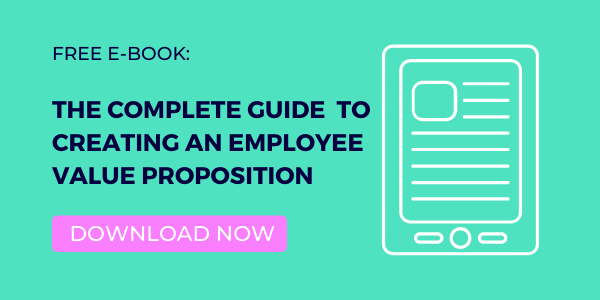Most startups don’t have the time to focus their energy on recruiting, let alone employer branding. Teams are working tirelessly to bring the company’s vision to fruition, juggling a number of different jobs while working long hours.
Taking the time to build out a concrete employer branding and recruitment strategy can play a significant role in a startup's success. This guide will help you understand why employer branding is important for startups, and discuss affordable and easy strategies you can implement.
See how your employer brand is performing in AI tools like ChatGPT and Google.
Why employer branding is critical for startups

Did you know, 23% of startups fail due to not having the right team? A strong employer brand can help you attract and hire the best candidates, which greatly improves your business outcomes. Here are a few more reasons why you should build out your employer brand.
Finding top talent is a major challenge
We get it, you're a small fish in a very big pond, and it is difficult to stand out from the major tech companies vying for the attention of top tech candidates with their flashy brand name and enticing employee value proposition (EVP). Just because you don’t have the same budget as larger, more established companies does not mean you can’t play their game — you just need to be a bit more strategic.
Compare your employer brand and EVP to companies that are of similar size or slightly larger than your company. This will help you gauge how your employer brand compares to other companies with similar funding and resources. Remember, your recruiting efforts will vary before, during and after a round of funding and you will need to adapt your employer branding efforts accordingly.
Great teams make great companies
If you're in the SMB or growth stage every individual contributor has a major impact on the company's success. Build a stellar company culture early on and develop an employer branding strategy that attracts job seekers who will build upon your current culture. If you're not sure where your culture stands, check out these 13 signs of a bad company culture. And if your culture needs a little help, check out these four simple steps to improve company culture.

Recruiting is a team effort
Startups often have a very small HR and recruitment team — if one at all. Everyone wears different hats — one of the elements that make startups an exciting and fun place to work. Your sales team may handle every stage of the customer lifecycle, and your finance team may also be your tech support team. There’s no reason you can’t leverage your entire team to support your employer branding efforts.
To get the most out of your employees, create guidelines for what you need and how they can help. Make sure your mission and vision are clear so your strategy is cohesive and job seekers see consistent information regardless of who it’s coming from.
If you have the budget, reward employees who refer great candidates by establishing an employee referral program. This will incentivize your team to participate in your employer branding efforts.
Supporting employee engagement Boosts Your Brand
Candidates that apply to early-stage startups are often enticed by the prospect of growth and innovation. However, as more employees are hired, your company culture will undoubtedly change, so it’s important to get the support of your team when new hires are made.
Host team outings, happy hours and other employee engagement activities that encourage coworkers to bond outside of work when someone new is hired. As a result, your team will work better together, be more engaged in their work and make a bigger impact on the success of your company.

How to create a stellar employer brand for your startup

Now that we've established the importance of an employer branding strategy for startups, let's dive into how to create a clear strategy. Don't worry, we'll follow-up this section with a few ideas, but first, here's how to create your employer brand from scratch.
Define a clear mission and values
Before you can build an employer brand, you need to know what your company represents. This will inform what you need to communicate to job seekers and stakeholders.
Creating a mission statement will unite your team toward a single goal as well as attract candidates who believe in your purpose. Core values help your team understand how to prioritize efforts and achieve your mission. They'll also help your team vet prospective candidates to see if their values align with those of your team.
Both mission and core values will be guiding forces for your employer brand, so it’s important to establish them early. Gather feedback from your team to make sure you've gained a majority agreement on how each is defined. Share your finalized versions with your entire team so they’re on board and better prepared to support your efforts.
Solidify your company culture
Company culture is a bit more difficult to define than your mission and values because there are so many moving parts that makeup culture. However, when 46% of candidates say that a company’s culture plays a significant role in their decision to even apply for a role, it’s in your best interest to communicate the nuances of your culture in your branding efforts.
Additionally, startup culture in and of itself is different from that of larger organizations. There are very few barriers between the C-suite and individual contributors because many people are juggling multiple roles. Everyone also plays a big role in creating the type of company culture. For a lot of job seekers, the stereotypical startup mentality of work hard, play hard is what draws them to younger, scrappier companies.
And while your company will grow and evolve over the years, it’s important to keep tabs on the culture you set out to have. As more people join the team and dynamics change, people can feel uneasy about the cultural changes. While that’s natural to some extent, you want to make sure changes are intentional and you’re hiring the right people who will live by your core values and help your team achieve its mission.
By communicating your company culture through your employer branding efforts, you will naturally attract candidates that will add to your culture rather than simply fit in.

Create candidate personas
While you may not be hiring niche specialists yet, you need to make sure you are hiring the right people who are capable and will excel in their role. Plus, it’s great to practice creating candidate personas when you’re only hiring a few roles rather than figuring it out when your team is in a hyper-growth stage.
These personas will help you tailor your employer branding efforts in a meaningful way to attract more specific individuals, which will save you time throughout the recruitment life cycle.
Narrow your sourcing strategy
You probably don’t have a full-blown HR team as a startup, so you need to utilize the resources you do have. The marketing team will be able to inform your recruitment marketing strategy because they understand your industry and business as well as the type of people you are looking to hire.
Ask your marketing team which platforms they utilize for specific buyer personas and how they create social copy for different platforms. This will help you better understand which platforms should be used based on the candidate personas you created as well as inspire ideas for content creation.

Promote your vision
People want to be part of the next big thing, but when you’re in the early stages, brand awareness can be an issue. It’s up to you to communicate who you are and what you do to inspire them to apply for open roles.
Share your short and long-term goals in your employer branding materials and get people excited about joining the company early on. Keep candidates in the loop when your team hits milestones and as new people join.
Remain transparent
It can be a bit intimidating to join a startup. There may not be a concrete prospect of job security, there may be expectations to work long hours or the need to juggle multiple roles.
Be honest and upfront in your employer branding materials and job descriptions as to exactly what you need and expect from future employees. That way, new hires won’t experience culture shock due to miscommunication during the recruitment process, and you will retain the great candidates you worked so hard to attract.
Shine a light on the fun and quirky side of your culture and employee value proposition with pictures of your team outings, office space and celebrations. Get people excited when you reach milestones that bring you closer to achieving your mission.
11 affordable and easy employer brand Ideas for startups

You don’t need a ton of resources to create a stellar employer brand and stand out from the competition. Here are a few ideas to get you started without breaking the bank.
1. Create fun and simple recruitment videos
You don’t need professional videographers to create an engaging recruitment video. Sure, if you have the money, it’s well worth the investment because you can repurpose a polished video across different platforms, but when you’re just getting started, there’s nothing wrong with a little iPhone action.
Coordinate with your team to conduct employee interviews and allow them to speak to your employer brand and their individual experiences. If you’re hosting a recruitment event, shoot live footage of the event to entice people to join. You can even have fun with it and shoot a music video or hop on a viral trend like the Mannequin Challenge.
2. Write an employer branding blog
If your website has blog functionality, set up a content plan for the type of long-form employer brand content you want to create and establish a publication schedule with assigned authors.
If you don’t currently have blog functionality, you can publish content to other platforms optimized for lengthy posts, like Medium. You can also guest write for other HR blogs that are already established to share your employer brand materials.
Keep it simple and ask employees about their time at your company and publish their responses with a photo. For more in-depth content, address questions job seekers may have about the application process or your team’s company culture.

3. Create a unique career page or host it on another platform
Include information beyond job descriptions on your career page, like your company’s application and recruitment process, employee resource groups, employee spotlights, recruitment videos, diversity statistics and programming, upcoming recruitment events and images of your office and employees.
While it’s important to have a career page, limited developer resources can make it difficult to create a page with a solid user experience. Fortunately, there are a number of alternative platforms to provide job seekers with the same pertinent information. Social media platforms are great for quickly sharing bite-sized information with a large audience. They also establish a clear line of communication with younger generations in the workforce.
HR-specific platforms are useful for sharing longer-form content about culture initiatives and employee benefits. For example, Built In company profiles have the functionality to build an employer branding profile that can be embedded into your company’s website with minimal developer assistance.
4. Implement a robust social media strategy
A social media strategy should be a significant part of your employer branding efforts. Not only is it one of the most cost-effective strategies, but the vast majority of millennials found their current job through social media.
Create a game plan for the platforms you want to target based on how you prioritize your open roles. See if anyone on your team is a social media guru and if they’d be willing to help you write social copy. If you have the funds, invest in a social media tool to save time and stay organized.
Social media is a unique way to shine light on your team’s day to day work life in fun and creative ways. Keep an eye out for trending topics and create clever memes that will resonate with your target candidates. Ask job seekers questions and contribute to industry conversations to boost engagement. Encourage your team to take and submit photos of their lives in the office for great candid content.
If done well, organic content has just as much (if not more) of an impact than paid ads, so it’s well worth the effort, especially if you don’t have cash to spend on social ads.

5. Build a talent community
A talent community consists of the candidates who have shown interest in your company and may have even applied or gone through the recruitment process, but didn’t end up working for you. Keep your talent community in close contact by regularly connecting with people who have interacted with your brand as a job seeker.
If you have an applicant tracking system (ATS), utilize it to keep track of your talent community. If you don’t have an ATS or an established talent community, create a list of people who have applied to your roles, attended your recruitment events, engaged with you on social platforms and former employees.
You can then utilize content you’ve created for your employer branding blogs, recruitment videos, social content, newsletters, job descriptions, etc. when reaching out to your talent community about available roles.
6. Send employer branding newsletters
Create a newsletter that includes information about open roles, recruitment events and any other information that would be beneficial to share with candidates. Depending on the frequency of your hiring needs, you can send a newsletter out weekly, bi-weekly, monthly or even quarterly.
While you don’t want to bombard job seekers with newsletters and cause them to unsubscribe, you do want to remain top of mind and keep interested job seekers updated on your open roles and happenings at your company.

7. Test out text recruiting
Text recruiting is a newer way for companies to promote their employer brand with candidates. Similar to a newsletter, if candidates opt-in, you can send them content that would interest them specifically.
You can segment job seekers based on their interests and past interactions to determine which roles they may be interested in and how serious they are about pursuing a new job. Invest in a recruitment tool that streamlines your process and ensures consistent content is sent to candidates.
8. Host low-key recruitment events
You don’t need to go all out with a bouncy castle and free food to make a recruitment event successful. For most candidates, recruitment events are already stressful enough, so take the edge off by hosting a casual hiring mixer. Rent out a local favorite restaurant or bar, and if you can afford it, offer free drinks or snacks.
Inform candidates that they don’t need to arrive in formal wear or prepare any material and make sure the vibe matches that of your company’s culture. Set up activities that allow for job seekers and employees to get to know one another in a casual setting rather. Candidates will appreciate your candor, and you'll get to see a more natural side of job seekers.

9. Attend industry events
Attend events that industry leaders are bound to be at. You’ll be able to make close connections with top professionals all while increasing brand awareness. Encourage people to follow your company on social, join your newsletter subscription for updates and attend your next recruitment event.
10. Create a memorable candidate experience
To really stand out from the crowd, you need to make your candidate experience memorable. Not only do three out of four candidates share a negative experience online, thus tarnishing your employer brand, but nearly half of job seekers will completely end their relationship with a company after having a bad candidate experience.
You can improve your candidate experience by streamlining processes, keeping in close contact with applicants and simplifying your application process. Adding a little personal touch to the experience will help candidates remember your company even if they don’t end up getting or accepting the job. It will build a network of candidates who are likely to write positive reviews and recommend people to your company.

11. Encourage your team to get involved
It’s critical to get your entire team involved in your employer branding strategy. Instead of paying out the wazoo for paid ads on social, encourage your team to share content on their personal channels, but don’t make it a requirement. Create a contest to see who can come up with the best or most engaging copy for social. You can also create content for them to repurpose to make sharing even easier for them.
Create a list of a few questions to ask employees about their experiences with your company and create simple employee spotlights that you can repurpose and quote from across different content.
Needless to say, there are plenty of affordable and easy options to improve your employer brand. While it may not have been a priority before, hopefully you now understand the importance of employer branding for startups. If you're looking for more resources to improve your strategy, check out other tips and tricks on employer branding.





